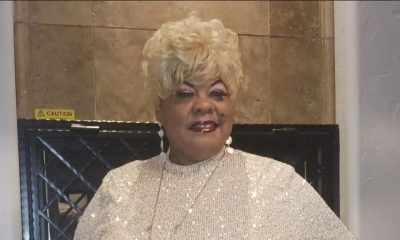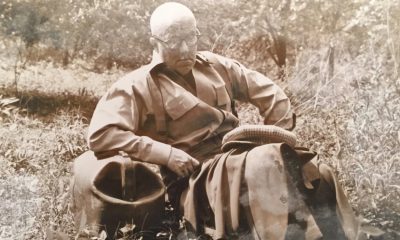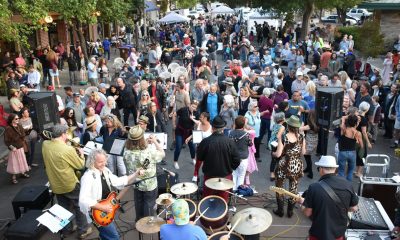Arts and Culture
Bay Area African American Women in Music: Blues “Gave Me the Experience to Stand Fast for the Master,” said Lillian Glenn
“I’ve got the meanest feelin’ I ever had. The man I got treated me so bad…I’m gettin’ mighty tired the way my daddy’s doggin’ me,” Lillian Glenn wailed in a robust contralto on “Doggin’ Me Blues” during her first session for Columbia Records in Dallas in 1927.
The 78 RPM record sold so well that the company recorded 10 more over the next two years, helping to establish the Kaufman, Texas-born singer as a star on the African American vaudeville circuit.
Yet, Glenn began having qualms about the type of tunes she was singing, some of them laced with sexual innuendo.
One Sunday evening in April 1929 at the 81 Theater in Atlanta, as the star of a traveling show, she had second thoughts while making her entrance as the orchestra played “Doggin’ Me Blues.”
“I walked out on the stage that night, but my mind wasn’t there,” she told this writer in 1979 while sitting in the living room of her North Oakland home. “I was working, making good money, but I didn’t like what I saw. I knew I couldn’t serve God and be where I was.”
Glenn recalled seeing men in her audiences get into a fight over one man seeing the other’s wife, or trying to. “I’d be singing and see all this going on. I’d say, ‘My God, I got to leave here. I don’t belong in this mess,’” she said.
She recalled standing on the 81 Theater stage silently for a few moments, missing her cue. She then kicked off her glittering rhinestone shoes and began tearing up the black velvet cape that she wore over her rhinestone-dotted blue chiffon dress.
“I got to the steps and walked down,” she continued. “The people were grabbing me by the arm, but I kept running till I got out the front door ‘cause God had spoken to me. He told me to get out of this place and go back home to my mama.”
After returning to Dallas, Glenn worked in a hotel and sang in churches during the Depression. During World War II, she moved to Oakland where she married Rev. H.R. Smith of Temple of Truth Baptist Church in West Oakland.
Glenn could be heard singing on remote broadcasts from the church on KWBR (later known as KDIA) for over a decade and on KEST twice a week as late as 1979.
Glenn, whose dates of birth and death are unknown, said she did not regret having once sung the blues for a living.
“I’m so glad I came through there,” she said. “It gave me the experience to stand fast for the Master. Can’t nothin’ shake me now.”
Alameda County
Bling It On: Holiday Lights Brighten Dark Nights All Around the Bay
On the block where I grew up in the 1960s, it was an unwritten agreement among the owners of those row homes to put up holiday lights: around the front window and door, along the porch banister, etc. Some put the Christmas tree in the window, and you could see it through the open slats of the blinds.

By Wanda Ravernell
I have always liked Christmas lights.
From my desk at my front window, I feel a quiet joy when the lights on the house across the street come on just as night falls.
On the block where I grew up in the 1960s, it was an unwritten agreement among the owners of those row homes to put up holiday lights: around the front window and door, along the porch banister, etc. Some put the Christmas tree in the window, and you could see it through the open slats of the blinds.
My father, the renegade of the block, made no effort with lights, so my mother hung a wreath with two bells in the window. Just enough to let you know someone was at home.
Two doors down was a different story. Mr. King, the overachiever of the block, went all out for Christmas: The tree in the window, the lights along the roof and a Santa on his sleigh on the porch roof.
There are a few ‘Mr. Kings’ in my neighborhood.
In particular is the gentleman down the street. For Halloween, they erected a 10-foot skeleton in the yard, placed ‘shrunken heads’ on fence poles, pumpkins on steps and swooping bat wings from the porch roof. They have not held back for Christmas.
The skeleton stayed up this year, this time swathed in lights, as is every other inch of the house front. It is a light show that rivals the one in the old Wanamaker’s department store in Philadelphia.
I would hate to see their light bill…
As the shortest day of the year approaches, make Mr. King’s spirit happy and get out and see the lights in your own neighborhood, shopping plazas and merchant areas.
Here are some places recommended by 510 Families and Johnny FunCheap.
Oakland
Oakland’s Temple Hill Holiday Lights and Gardens is the place to go for a drive-by or a leisurely stroll for a religious holiday experience. Wear a jacket, because it’s chilly outside the Church of Jesus Christ of Latter-day Saints, at 4220 Lincoln Ave., particularly after dark. The gardens are open all day from 9 a.m. to 9 p.m. with the lights on from dusk until closing.
Alameda
Just across the High Street Bridge from Oakland, you’ll find Christmas Tree Lane in Alameda.
On Thompson Avenue between High Street and Fernside drive, displays range from classic trees and blow-ups to a comedic response to the film “The Nightmare Before Christmas.” Lights turn on at dusk and can be seen through the first week in January.
Berkeley
The Fourth Street business district from University Avenue to Virginia Street in Berkeley comes alive with lights beginning at 5 p.m. through Jan. 1, 2026.
There’s also a display at one house at 928 Arlington St., and, for children, the Tilden Park Carousel Winter Wonderland runs through Jan. 4, 2026. Closed Christmas Day. For more information and tickets, call (510) 559-1004.
Richmond
The Sundar Shadi Holiday Display, featuring a recreation of the town of Bethlehem with life-size figures, is open through Dec. 26 at 7501 Moeser Lane in El Cerrito.
Marin County
In Marin, the go-to spot for ‘oohs and ahhs’ is the Holiday Light Spectacular from 4-9 p.m. through Jan. 4, 2026, at Marin Center Fairgrounds at 10 Ave of the Flags in San Rafael through Jan. 4. Displays dazzle, with lighted walkways and activities almost daily. For more info, go to: www.marincounty.gov/departments/cultural-services/department-sponsored-events/holiday-light-spectacular
The arches at Marin County Civic Center at 3501 Civic Center Dr. will also be illuminated nightly.
San Francisco
Look for light installations in Golden Gate Park, chocolate and cheer at Ghirardelli Square, and downtown, the ice rink in Union Square and the holiday tree in Civic Center Plaza are enchanting spots day and night. For neighborhoods, you can’t beat the streets in Noe Valley, Pacific Heights, and Bernal Heights. For glee and over-the-top glitz there’s the Castro, particularly at 68 Castro Street.
Livermore
The winner of the 2024 Great Light Flight award, Deacon Dave has set up his display with a group of creative volunteers at 352 Hillcrest Avenue since 1982. See it through Jan. 1, 2026. For more info, go to https://www.casadelpomba.com
Fremont
Crippsmas Place is a community of over 90 decorated homes with candy canes passed out nightly through Dec. 31. A tradition since 1967, the event features visits by Mr. and Mrs. Claus on Dec. 18 and Dec. 23 and entertainment by the Tri-M Honor Society at 6 p.m. on Dec. 22. Chrippsmas Place is located on: Cripps Place, Asquith Place, Nicolet Court, Wellington Place, Perkins Street, and the stretch of Nicolet Avenue between Gibraltar Drive and Perkins Street.
Advice
COMMENTARY: If You Don’t Want Your ‘Black Card’ Revoked, Watch What You Bring to Holiday Dinners
From Thanksgiving to Christmas to New Year’s Day, whether it’s the dining room table or the bid whist (Spades? Uno, anyone?) table, your card may be in danger.

By Wanda Ravernell
Post Staff
From the fourth week of November to the first week in January, if you are of African descent, but particularly African American, certain violations of cultural etiquette will get your ‘Black card’ revoked.
From Thanksgiving to Christmas to New Year’s Day, whether it’s the dining room table or the bid whist (Spades? Uno, anyone?) table, your card may be in danger.
It could take until Super Bowl Sunday for reinstatement.
I don’t know much about the card table, but for years I was on probation by the ‘Aunties,’ the givers and takers of Black cards.
How I Got into Trouble
It was 1970-something and I was influenced by the health food movement that emerged from the hippie era. A vegetarian (which was then considered sacrilegious by most Black people I knew) prepared me a simple meal: grated cheese over steamed broccoli, lentils, and brown rice.
I introduced the broccoli dish at the Friday night supper with my aunt and grandfather. She pronounced the bright green broccoli undone, but she ate it. (I did not, of course, try brown rice on them.)
I knew that I would be allowed back in the kitchen when she attempted the dish, but the broccoli had been cooked to death. (Y’all remember when ALL vegetables, not just greens, were cooked to mush?)
My Black card, which had been revoked was then reattained because they ate what I prepared and imitated it.
Over the decades, various transgressions have become normalized. I remember when having a smoked turkey neck instead of a ham hock in collard greens was greeted with mumblings and murmurings at both the dining room and card tables. Then came vegan versions with just olive oil (What? No Crisco? No bacon, at least?) and garlic. And now my husband stir fries his collards in a wok.
But No Matter How Things Have Changed…
At holiday meals, there are assigned tasks. Uncle Jack chopped raw onions when needed. Uncle Buddy made the fruit salad for Easter. My mother brought the greens in winter, macaroni salad in summer. Aunt Deanie did the macaroni and cheese, and the great aunts, my deceased grandmother’s sisters, oversaw the preparation of the roast beef, turkey, and ham. My father, if he were present, did the carving.
These designations/assignments were binding agreements that could stand up in a court of law. Do not violate the law of assignments by bringing some other version of a tried-and-true dish, even if you call it a new ‘cheese and noodle item’ to ‘try out.’ The auntie lawgivers know what you are trying to do. It’s called a menu coup d’état, and they are not having it.
The time for experiments is in your own home: your spouse and kids are the Guinea pigs.
My mother’s variation of a classic that I detested from that Sunday to the present was adding crushed pineapple to mashed sweet potatoes. A relative stops by, tries it, and then it can be introduced as an add-on to the standard holiday menu.
My Aunt Vivian’s concoctions from Good Housekeeping or Ladies’ Home Journal magazine also made it to the Black people’s tables all over the country in the form of a green bean casserole.
What Not to Do and How Did It Cross Your Mind?
People are, of all things holy, preparing mac ‘n’ cheese with so much sugar it tastes like custard with noodles in it.
Also showing up in the wrong places: raisins. Raisins have been reported in the stuffing (makes no sense unless it’s in a ‘sweet meats’ dish), in a pan of corn bread, and – heresy in the Black kitchen – the MAC ‘n’ CHEESE.
These are not mere allegations: There is photographic evidence of these Black card violations, but I don’t want to defame witnesses who remained present at the scene of the crimes.
The cook – bless his/her heart – was probably well-meaning, if ignorant. Maybe they got the idea from a social media influencer, much like Aunt Viv got recipes from magazines.
Thankfully, a long-winded blessing of the food at the table can give the wary attendee time to locate the oddity’s place on the table and plan accordingly.
But who knows? Innovation always prevails, for, as the old folks say, ‘waste makes want.’ What if the leftovers were cut up, dipped in breadcrumbs and deep fried? The next day, that dish might make it to the TV tray by the card table.
An older cousin – on her way to being an Auntie – in her bonnet, leggings, T-shirt, and bunny slippers and too tired to object, might try it and like it….
And if she ‘rubs your head’ after eating it, the new dish might be a winner and (Whew!) everybody, thanks God, keeps their Black cards.
Until the next time.
Arts and Culture
Fayeth Gardens Holds 3rd Annual Kwanzaa Celebration at Hayward City Hall on Dec. 28
Kwanzaa celebrates seven principles – Nguzu Saba – that support an ideal of community, beginning from Dec. 26 to Jan. 1. Those principles, in Swahili, are: Umoja (Unity), Kujichagulia (Self-Determination), Ujima (Collective Work & Responsibility), Ujamaa (Collective Economics), Nia (Purpose), Kuumba (Creativity) and Imani (Faith).

Entertainment, vendors, and special honors for Sankofa Lifetime Achievement awardees
Special to The Post
Celebrating Ujima, the principle of ‘Collective Work and Responsibility,’ Fayeth Gardens’ 3rd Annual Kwanzaa Celebration will be held on Dec. 28, from 12 noon to 5 p.m.
Kwanzaa celebrates seven principles – Nguzu Saba – that support an ideal of community, beginning from Dec. 26 to Jan. 1.
Those principles, in Swahili, are: Umoja (Unity), Kujichagulia (Self-Determination), Ujima (Collective Work & Responsibility), Ujamaa (Collective Economics), Nia (Purpose), Kuumba (Creativity) and Imani (Faith).
The free event at Hayward City Hall at 777 B St. will feature live entertainment, a guest speaker, awards for community activists whose work reflects the principle of Ujima, vendors and an honoring of the ancestors by Awon Ohun Omnira (Voices of Freedom).
On stage will be the Touch of Class Band, a New Orleans Second-Line Band, and the California Griot Storytellers. Bring the children to have fun in the Kids Korner.
Velda Goe, who has been celebrating Kwanzaa since it started in the 1960s, noticed there was no public celebration of the holiday in Hayward when she moved to the city in 2008.
“I started it a couple of years ago,” she said, “and hopefully it will continue just like the cultural events by other nationalities (in Hayward). The Afro-descendent people of Hayward deserve cultural recognition as well.”
Goe also believes it’s important that Kwanzaa gets its due because “there are so many misconceptions,” particularly by people of other nationalities, who are under the impression “that Kwanzaa is a cult, a religion, or replaces Christmas.”
The celebration, which is open to all, can have the effect of helping guests see that Kwanzaa’a principles and purpose are common to all
This year’s Sankofa Lifetime Awardees are:
- Mrs. Freddye M. Davis: President of the South Hayward NAACP
•Baba Arnold X.C. Perkins: Co-founder of the Brotherhood of Elders
•Frederick Jordan,: Legendary founder of F.E. Jordan & Associates and the Design Engineer for the Charles P. Howard Container Terminal at the Port of Oakland + 1,000 Projects
Come dressed up in your best African wear to enter a raffle for a prize for best-dressed Afrocentric King and Queen.A free, healthy soul food lunch is available with an Eventbrite ticket, which can be found at for free lunch is available from for 11:30 to 12 p.m.
In its third year, the event is the brainchild of Velda Goe, founder of Fayeth Gardens, a community planting site to educate and provide a means for urban dwellers to grow healthy food for their families and develop life-sustaining eating habits.
Interested in being a vendor, volunteer, or sponsor? Reach out to FayethGardens@gmail.com
For tickets, go to: https://www.eventbrite.com/e/fayeth-gardens-3rd-annual-kwanzaa-celebration-at-hayward-city-hall-tickets-1974966953322
-

 #NNPA BlackPress4 weeks ago
#NNPA BlackPress4 weeks agoLIHEAP Funds Released After Weeks of Delay as States and the District Rush to Protect Households from the Cold
-

 Alameda County4 weeks ago
Alameda County4 weeks agoSeth Curry Makes Impressive Debut with the Golden State Warriors
-

 #NNPA BlackPress4 weeks ago
#NNPA BlackPress4 weeks agoSeven Steps to Help Your Child Build Meaningful Connections
-

 #NNPA BlackPress4 weeks ago
#NNPA BlackPress4 weeks agoSeven Steps to Help Your Child Build Meaningful Connections
-

 #NNPA BlackPress4 weeks ago
#NNPA BlackPress4 weeks agoTrinidad and Tobago – Prime Minister Confirms U.S. Marines Working on Tobago Radar System
-

 #NNPA BlackPress4 weeks ago
#NNPA BlackPress4 weeks agoThanksgiving Celebrated Across the Tri-State
-

 #NNPA BlackPress4 weeks ago
#NNPA BlackPress4 weeks agoTeens Reject Today’s News as Trump Intensifies His Assault on the Press
-

 #NNPA BlackPress4 weeks ago
#NNPA BlackPress4 weeks agoBreaking the Silence: Black Veterans Speak Out on PTSD and the Path to Recovery






















































